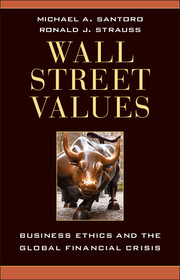Book contents
- Frontmatter
- Contents
- Preface
- Acknowledgments
- Part One Background and Theoretical Framework
- Part Two Wall Street Business Model, Regulation, and Values in Transition
- Part Three Policy Recommendations and Sustainable Values for Wall Street in the Twenty-First Century
- Chapter Six Wall Street Regulation for the Twenty-First Century
- Chapter Seven Wall Street Values for the Twenty-First Century
- Notes
- Index
Chapter Seven - Wall Street Values for the Twenty-First Century
from Part Three - Policy Recommendations and Sustainable Values for Wall Street in the Twenty-First Century
Published online by Cambridge University Press: 05 February 2013
- Frontmatter
- Contents
- Preface
- Acknowledgments
- Part One Background and Theoretical Framework
- Part Two Wall Street Business Model, Regulation, and Values in Transition
- Part Three Policy Recommendations and Sustainable Values for Wall Street in the Twenty-First Century
- Chapter Six Wall Street Regulation for the Twenty-First Century
- Chapter Seven Wall Street Values for the Twenty-First Century
- Notes
- Index
Summary
Introduction
Government can help align Wall Street interests with those of Main Street by channeling self-interested behavior into socially useful outcomes. It can serve as a watchdog, attempting to detect and prevent illegal behavior. Government cannot, however, replace the role of business ethics. Despite numerous regulatory failures and outsized errors in business judgment, the financial crisis was fundamentally a moral crisis. At great cost, we learned that greed, unless tempered by good values, does not “work” from a social perspective. Ethically unmoored, Wall Street became a danger to free markets, the economy, and itself. Only a massive public bailout saved it from the consequences of its own moral decay.
Wall Street today remains morally adrift. It no longer adheres to the customer-driven values that sustained it since the 1930s, yet it has not adopted values and ethical principles suitable for its evolving business models. It lurches along in a moral wasteland from which it may take years, if not decades, to emerge. The prototypical postmillennial Wall Street executive is ethically untroubled, even when securities sold to clients are virtually assured to lose value. Goldman Sachs CEO Lloyd Blankfein captured the essence of this moral sensibility when he described his formative experience at the firm’s commodities trading unit: “We didn’t have the word ‘client’ or ‘customer,’ we had “counterparties” – and that’s because we didn’t know how to spell the word ‘adversary.’” In an earlier era, Wall Street professionals would not have tolerated this kind of sentiment or rampant abuse of customers. However, the postmillennial financial executive lacks relevant principles for sound ethical judgment. The values of the past no longer apply, but no principles have emerged to replace them. In earlier chapters we analyzed how Wall Street arrived at this moral quagmire. In this chapter we consider the prospects for restoring values to a central role on Wall Street.
- Type
- Chapter
- Information
- Wall Street ValuesBusiness Ethics and the Global Financial Crisis, pp. 178 - 204Publisher: Cambridge University PressPrint publication year: 2012



